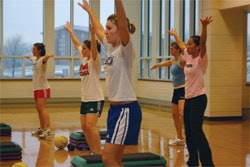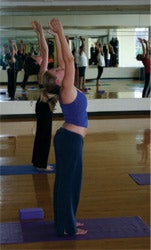The legacy of a federally funded wellness initiative, left for dead more than a decade ago, can be found in healthy lifestyle programs thriving at college rec centers nationwide.
 Excersise class
Excersise class
Created in 1992 to help campus rec administrators teach and enable their students to curb alcohol and drug abuse, Natural High was such a central component of NIRSA that it even had its own dedicated section on the association's web site, packed with programming ideas and a comprehensive resource manual. That link to NIRSA's home page is no longer active, but the archived Natural High site (nirsa.org/naturalhigh) still proves useful to college rec administrators. "Occasionally, I get people who want the materials," says Brown. "The information's there. For the people who still need help, I have it."
Alas, Natural High was never meant to last. The initiative was originally supported by a two-year, $250,000 federal Fund for the Improvement of Postsecondary Education (FIPSE) grant. However, soon after its creation, Natural High expanded from its function as an exclusively preventive program into a comprehensive health and wellness initiative. And now, more than a decade since the initiative's funding dried up, the descendants of Natural High are alive and well, as evidenced by a diverse set of healthy lifestyle programs on college campuses nationwide.
"I think the name `Natural High' is irrelevant," says Judith Bryant, vice president of student affairs and dean of students at North Georgia College & State University and the co-author of NIRSA's FIPSE grant proposal. "I'm very gratified to see recreational sports professionals trying to take the message to their constituents that there are benefits to a healthy lifestyle."
Choosing Wisely Campus rec officials are communicating that message in a number of different ways. However, at Texas A&M University-Corpus Christi, recreational sports director Jacqueline Hamilton and her staff have made a conscious decision to remain focused on preventing alcohol and drug abuse. That school's healthy lifestyle programming centers on two key events, both of which are designed to offer students alternatives to high-risk partying.
Twice a year, TAMU-CC Recreational Sports hosts a Dive-In Movie night, inviting students to lounge in and around the campus' outdoor pool and watch a film on an oversized projection screen positioned off the pool's deep end. Recreational Sports provides food, nonalcoholic drinks and even gives out door prizes - but there's a catch. "In order for them to win the door prizes, students have to answer some alcohol-related trivia questions," says Hamilton.
Such discreet reminders regarding safe behaviors aren't the Dive-In Movie's only subtleties. The event is traditionally scheduled on a Thursday night, the most popular evening for Corpus Christi students to go barhopping. "Thursday night was chosen to keep them from going out to the clubs," says Hamilton. "I don't know if the students realize that. But they still come, watch the movie and have a good time."
According to Hamilton, students also enjoy Wild & Wacky Wednesday, held the week before spring break to encourage students to recreate safely during their impending vacation. Cosponsored by Recreational Sports and the Campus Activities Board, Wild & Wacky Wednesday is held midday on a prominent campus lawn. Featured at the event are inflatable games, food and T-shirt giveaways. Similar to the Dive-In Movie, students who want free food or prizes must participate in what Hamilton calls "smart choice surveys" - simple questionnaires designed to raise awareness regarding destructive spring-break behaviors. "The surveys focus not just on drunk driving, but drunk sex, too," says Hamilton. "We want students to have a smart spring break."
The cost of putting on Wild & Wacky Wednesday ranges from $2,500 to $3,000. But for Hamilton, the investment is well worth it. "Our campus is relatively small. We have about 8,200 students," she says of TAMU-CC, which goes by the moniker "The Island University" because of its physical location on a 240-acre island 10 miles from downtown Corpus Christi. "We have a lot of nontraditional students who wouldn't normally attend many of these sorts of things. So if we get several hundred students at a Wild & Wacky Wednesday, we feel pretty good."
Blockbuster Rewards Getting students to feel good about themselves is what the University of Connecticut's Natural High programming is all about. In fact, that school's Department of Recreational Services has retained the Natural High name to encompass all of its wellness programs, adding the tagline "Where the Student Body Develops." Such development occurs through programs designed to help students improve their self-esteem. The list includes an annual Body Pride Fair, body composition testing sessions, blood pressure screenings, yoga and meditation classes, and Stress Down Day, which is held each semester in advance of finals week. "On those days, we'll have a fair where people can do fun activities to reduce stress," says Michael D'Alfonso, UConn's coordinator of fitness and wellness.
To offer such events, D'Alfonso has sought the assistance of UConn's Student Health Services Department. The fall Student Health Fair, for example, is spearheaded by that organization's Nutrition and Wellness departments and regularly draws anywhere from 200 to 500 students. "We use the resources around campus to make something happen," says D'Alfonso. "Cooperating is really helpful for us."
Similarly, D'Alfonso solicits donations of material resources for Physical Activity Weeks (P.A.W.), a springtime rewards incentive program that encourages students to be active. "They'll sign up and get a card that they can get punched or initialed when they come to an event," says D'Alfonso. Eligible activities include visits to the campus' Student Recreation Facility and participation in BodyWise fitness classes, Natural High programs, intramural sports or HuskyXcursions, which D'Alfonso cites as the most popular option. Husky-Xcursions are day or weekend trips that take UConn students off campus to go hiking, trail running, cross-country skiing, snowshoeing, dog sledding, kayaking and rock climbing.
At the end of the program, students who collect enough points can receive prizes such as T-shirts, water bottles and gift certificates to UConn's bookstore. P.A.W.'s incentives have proven motivation enough to encourage an average of more than 200 students to sign up for the program each spring since 2000. That being said, D'Alfonso concedes there's not much of a secret to the success of P.A.W. and other UConn Natural High programs. "They're free," he says. "Students always love that."
A Collaborative Effort At James Madison University, wellness isn't just an option. It's a mandate.
The school's general education program - required for graduation of all undergraduate students - is built on five "clusters," one of which is titled "Individuals in the Human Community." To complete this cluster, students must take one course each in two areas: Wellness and Social Community. A central component of General Health 100, one of three courses that can be used to satisfy the Wellness requirement and that attracts 2,000 freshmen each year, is called the Wellness Passport. "The class is about general wellness issues," explains Julie Wallace Carr, senior associate director for programming with James Madison University Recreation. "For a class assignment, students are required to attend five programs supported by many of the departments on campus, and each program is designated with a dimension of wellness. Students participate in each program and then get a stamp."
 Excersise class
Excersise class
Although the Wellness Passport isn't directly related to James Madison's healthy lifestyle programming, Wallace Carr says many students involved in the Passport program unwittingly participate in direct descendants of the school's early Natural High incarnations.
They include happy-hour aerobics classes, held each Friday from 5:15 to 6:05 p.m. Fitness instructors choose a different theme (from step to hip-hop to kickboxing) each week to keep the class fresh and participants guessing. Box Out Stress - which combines a 30-minute lecture on stress management with 45 minutes of boxing fitness for stress relief - is another ideal option for students who enjoy breaking a sweat.
Students looking to unwind can take advantage of Weather the Winter Blues, a class that offers tips on overcoming cabin fever, as well as University Recreation's slate of massage therapy classes and workshops - Tension Time Out, Foot and Hand Massage, and Partner Massage among them. In addition, an activity called Yogis Take a Hike is held each spring. While this daylong event's title may sound a bit odd, Wallace Carr says that Yogis Take a Hike is one of University Recreation's most popular offerings, undoubtedly because of its crossover potential. "Our group fitness instructors go with our adventure trip leaders, all of them student employees, and lead students on a hike," she says. "Then, at the top of the mountain, they do yoga."
Wallace Carr credits that type of open-minded approach - and the willingness to defer to the expertise of other campus organizations - with sustaining James Madison's healthy lifestyle programs. "It's easy to call up somebody from the counseling center and say, `Can you come over and help me with the Weather the Winter Blues event and be my guest speaker?' " she says. "Originally, we collaborated with the health center, the counseling center and campus ministries to do the Natural High program together. We've all kind of continued with programming similar to what we did in the past, although those programs now have different names. But that collaborative effort - not just the recreation center's - is probably what's kept everything alive."
For North Georgia's Bryant, tales of such collaboration serve as proof positive that Natural High - or the original concept behind the initiative - has matured at least to adolescence.
Fourteen years ago, Bryant and her colleagues embarked on a mission to combat alcohol and drug abuse among university student bodies. Over time, the programs born of that initiative broadened to embrace efforts whose aims are as focused on improving students' self-esteem as they are their day-to-day health.
It's not difficult to understand how campus rec administrators connected the dots along the way. "We found from our research that participation in recreational sports enhances the individual's sense of achievement," says Bryant. "I'm not sure I have all the answers as to why students abuse alcohol. But I think there's certainly some correlation to social confidence - or what students perceive to be an enhancement of their social confidence - if they can do things when drunk that they wouldn't do otherwise."
In Bryant's mind, the duty falls squarely upon campus rec agencies to develop and provide healthy lifestyle programs that offer bona fide means by which students can improve their social confidence. And while Bryant praises the efforts of schools like James Madison, UConn and TAMU-CC - "Recreational sports professionals are getting better at articulating to students the outcomes of their participation," she says, "and getting better at assessing them" - she feels she has yet to see the full maturation of the Natural High initiative.
"Hopefully, we can get more sophisticated," says Bryant. "There's a real potential to improve students' individual performance and help them understand the downside of alcohol abuse. And believe me, there's plenty of need. This may not be the be-all, end-all, but everybody needs to do their part because the downside is pretty ugly."
































